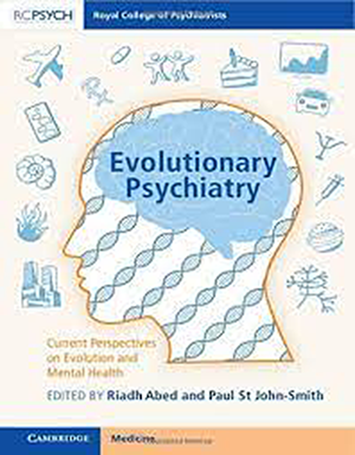
Despite occupying central importance in biology, evolution is neglected not only in mainstream medicine and psychiatry but also in medical education, research and the development of clinical applications.
The evolutionary perspective asks important and ‘ultimate’ questions about why we as a species are vulnerable to mental illness, above and beyond the ‘proximate’ questions currently posed in mainstream psychiatry as to ‘how’ we become unwell. The evolutionary perspective thus examines our long-evolved systems and traits relating to mood, cognition and social behaviour in the context of our development as a species and in the context of the modern and increasingly unnatural environments in which many of us reside.
Riadh Abed and Paul St John-Smith have been leading lights in the rapidly developing new discipline of evolutionary psychiatry and have over the past decade made multiple important contributions to the field, including the publication of numerous papers on evolutionary aspects of major psychiatric disorders and the establishment of the Royal College of Psychiatrists’ Evolutionary Psychiatry Special Interest Group.
They have now added another vital contribution to the field in publishing this multi-author textbook, which should be essential reading for anyone working in the area of mental illness – whether that be in clinical, research or academic zones, and whether they have an interest in evolution or not.
Abed and St John-Smith have contributed to several of the chapters and edited the entire volume, which includes chapters from all of the world's leading thinkers in this field. The reader will benefit from a collection of curated chapters from a wide variety of experts.
After the introductory chapter (by Abed and St John-Smith) and a review and critique of the current (flawed) biopsychosocial model (by Adam Hunt), the next two chapters (by Derek Tracy) focus on hominin evolution, thus enabling the foundations of this text to be firmly set from the beginning.
Nikhil Chaudhary and Gul Deniz Salali then have a chapter on hunter-gatherers and mental disorders, before two chapters from Randolph Nesse, the world's leading evolutionary psychiatrist. In the first of these, Nesse provides a general overview of mental disorders from an evolutionary perspective and in the second he writes about anxiety disorders from an evolutionary perspective.
Thereafter there are individual chapters on depression, suicide, schizophrenia, eating disorders, substance use disorders, childhood trauma, neurodevelopmental disorders, maternal influences and dementia. The authors are too many to mention in this review but include many other thought leaders in this field, such as Martin Brune, C.A. Soper, Robin Dunbar and Agnes Ayton, along with new emerging researchers and clinicians such as Markus Rantala and Annie Swanepoel.
The final three chapters focus on everyday and clinical applications of evolutionary thinking, including chapters on psychopharmacology and on clinical care (the latter chapter by Alfonso Troisi).
The only criticism that one could level at this volume is that it might have benefited from additional stand-alone chapters on research implications for the evolutionary perspective and perhaps even a chapter on how educational inputs can be developed at undergraduate and postgraduate levels.
There is no doubt that the evolutionary perspective has endless potential to enhance how we conceptualise mental health and illness and this perspective will likely generate multiple new research questions and clinical applications.
And there is no doubt that this textbook will be the go-to volume for anyone interested in this field.




eLetters
No eLetters have been published for this article.